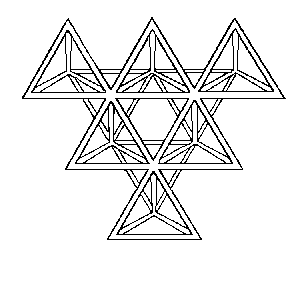
Return to Mark/Space
It was on the 11th of June 1965, over thirty years ago, that I first heard Allen Ginsberg at the International Poetry Reading at the Royal Albert Hall in London. We turned up in our thousands to hear some of the best poets of the Beat Generaton.
When Allen Ginsberg stood up to read his poems you could feel an electric charge in the air. There he was, like an Old Testament prophet, with his long dark hair and bushy beard, his voice reverberating with emotional intensity. Never before in that hallowed hall had such outrageous and colourful language been heard. Someone shouted out from behind me, "Go back to the gas chambers". I saw a couple scurrying out with their children. Hearing Allen that first time was a revelatory and illuminating experience.
That event and his presence in London that summer, helped kindle the spark that set the underground movement alight in the mid-sixties.
But it was ten years earlier, on the 13th of October 1955, in San Francisco, at the first public reading of "Howl" that Allen Ginsberg achieved fame and notoriety.
Micheal McClure, one of the poets reading that night, later told Allen that "Howl" was his "metamorphosis from a quiet brilliant burning bohemian scholar, trapped by his flames and repressions, to epic vocal bard".
A decade earlier, during his student days, at Columbia University in New York, he formed life long friendships with Jack Kerouac, William Burroughs and Neal Cassady. During those early days in New York the seeds were planted that would influence the literature and life-styles of young people for years to come.
I next saw Allen Ginsberg in London during the "Summer of Love" in 1967, when the flower children were in full bloom, at two memorable events. The Congress of the Dialectics of Liberation at the Roundhouse in Chalk Farm, and at the Legalise Pot Rally in Hyde Park, where a policeman stopped him chanting and playing his harmonium, as it broke park by-laws.
Earlier that year, in January 1967, Allen together with Timothy Leary chanted mantras at the Human Be-In at the Golden Gate Park in San Francisco where thirty thousand people assembled for a "Gathering of the Tribes", with music supplied by The Grateful Dead and Jefferson Airplane.
A|len Ginsberg was accepted as an elder statesman of the Counter-Culture, one of the few older people the hippies thought they could trust.
It was purely by chance that I went along to hear Allen and his long-time lover Peter Orlovsky, at the Roundhouse one cold November evening in 1979, and was touched by Allen's spiritual warmth and gentle serenity.
I came away with two books that would lead me on a great voyage of discovery. One of them was "As Ever" the collected correspondance of Allen and Neal Cassady, dating from the forties to Neal's tragic death in the sixties. The other was "Indian Journals", Allen's notebook writings, dream fragments and night thoughts written during his trip to India with Peter in 1962/3.
As you can imagine, it is a great privilege for me to help bring Allen Ginsberg to Megatripolis in Heaven, and introduce him to a new younger audience, here in the heart of London, a short distance as the crow flies from the street where his beloved William Blake wrote "Songs of Innocence", two hundred years ago.
I shall always remember Allen's rendering of "Who Be Kind To" at the Royal Albert Hall in 1965. Let me quote a fragment of the poem:
"Tonite lets all make love in London as if it were 2001 the years of thrilling god."
Bom Bom Mahadev! Welcome Allen Ginsberg.
Afterword:
"If you missed this event, you missed a moment of history. Ginsberg was in fine form at the tail-end of a hectic visit to London. The place was packed, the audience mixed (mostly NewGen with a representative sample of Beats, Postmoderns, and media Notables), and the atmosphere electric. The question-and-answer session -- held upstairs after the formal reading of poetry -- was filled to overcapacity, temperature hitting fainting level... and what was originally scheduled to be an half hour stretched to an hour, ending at the stroke of midnight. Both Ginsberg and audience transcendent.
"A film crew captured the evening's action (tentatively to be broadcast on channel 4), and Anne Cosentino handled the live internet coverage. If you missed this live, don't miss it on the wire (we'll post any broadcast dates)". --Henry W.Targowski (in Mark/Space , friday 20 October 1995).
And:
City Lights Bookshop
(Literary home of the Beat Generation)
Introduction to Allen Ginsberg by Lee Harris
(on the occasion of Allen Ginsberg's appearance at the Megatripolis club in London, England, on thursday 19 October 1995... this appearance was filmed, video'd, anternet.)
Literary Kicks -- Allen Ginsberg Biography
(Levi Asher's biography of Allen Ginsberg with a link to bibliography)
"this site has really and truly developed, it's probably the best overview on the beat scene available on the internet... the personal interest of one begat the joint effort of others... do check it out...it's absolutely wonderful and most highly recommended." --Henry W.Targowski.
Shadow Changes Into Bone -- Mongo's Allen Ginsberg Page
("My goal is to be the clearinghouse for all information on Allen Ginsberg existing on the Web. I think I've gone a long way toward that goal, with several hundred links, pointing to poems, photos, interviews, articles, commentary, humor and other assorted Ginsbergia." --Mongo BearWolf.
"A truly major resource on Ginsberg... very highly recommended." --Henry W.Targowski)
|
|
|
